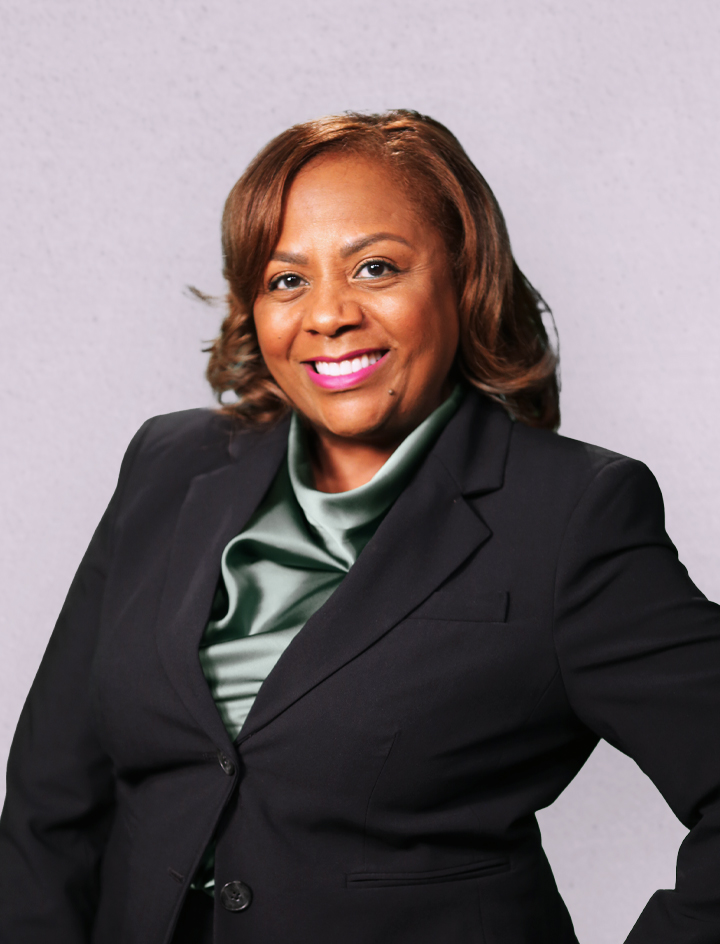
ChFC®, RICP®
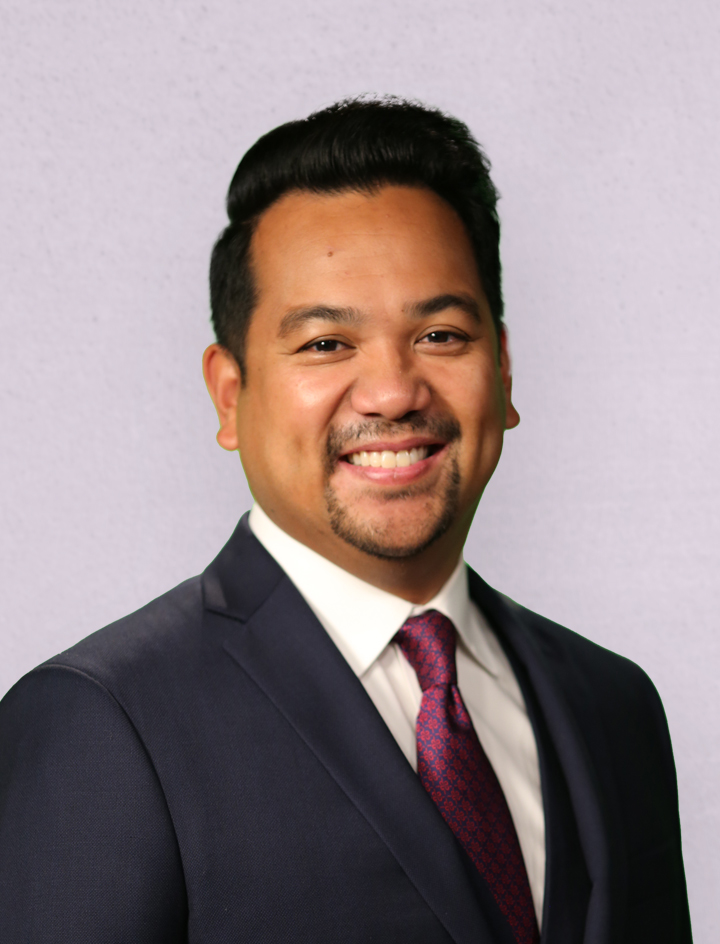
ChFC®, CLU®, AAMS®, CWS®, AIF®

Series 6, Series 63, FSCP®, CLU®
Author
Subscribe to Newsletter
Related Posts
INDUSTRY EVENT: InvestmentNews Women Advisor Summit
Author
Subscribe to Newsletter
Related Posts
INDUSTRY EVENT: Stetson’s National Conference on Special Needs Planning and Special Needs Trusts
Author
Subscribe to Newsletter
Related Posts
News Roundup: December 2025
View DetailsThe Future of Advice
View DetailsRetirement Planning On-Demand Webcasts
Timely Topics for Retirement Planners
Listen in as our team of thought leaders discuss important topics such as how to election-proof retirement plans, the Chevron case, new rules for required minimum distributions (RMDs), and more.
Author
Subscribe to Newsletter
Related Posts
News Roundup: December 2025
View DetailsThe Future of Advice
View DetailsEthics In Financial Services Philanthropic Planning Insights
Ethics Through the Lens of Philanthropic Planning

Managing director of the American College Cary M. Maguire Center for Ethics in Financial Services, Azish Filabi, JD, MA sits down with The College’s Chartered Advisor in Philanthropy® (CAP®) Program director and assistant professor of philanthropy Jennifer Lehman PhD, JD, CFP®, CAP® to discuss the ethical considerations advisors and other financial professionals must make when offering philanthropic planning services in a new continuing education (CE) opportunity available on Knowledge Hub+.
Filabi kicks off the discussion by reflecting on her history as a professional, stating that she has always worked to ensure organizations have the right governance structures in place and the right tools in place so they can consider ethics in their own personal decision-making as well as the impact they’re having on society.
She goes on to discuss the work performed at the Center for Ethics in Financial Services, stating the importance of the group’s research mission and outreach. In reference to this research, Filabi explains the purpose as “learning about the challenges that leaders and individuals are facing with respect to ethics so that can reflect back on the work that we do.” By completing this research, Filabi believes that the Center for Ethics will be able to provide the industry with valuable lessons relating to ethical concerns in the field.
Trust in Financial Services
One of these key lessons focuses on the topic of trust in financial services. Filabi shares that “Everyone I talk to highlighted trust as being a key factor in effective work that we do because it's essentially the glue that brings it all together. Some people went as far as to say that they're not in the business of selling financial products. They're selling trust because people have to trust us as professionals to be able to have their money in our good hands. Because trust is so important to financial services, the Center offers a certificate program on Advanced Strategies for Building Trust to help leaders access tools and frameworks to address this challenge.”
Lehman ties this back to the mission of The American College of Financial Services as a whole, stating a goal of providing applied financial knowledge and education, promoting lifelong learning, and advocating for ethical standards to benefit society. As Lehman points out, philanthropy is a key part of the profession tied to social impact.
Filabi weighs in on this, providing a description of ethics in the industry. She emphasizes the importance of doing no harm and acting in accordance with legal requirements while navigating opportunities. However, she points out that this is a more simplistic view on ethics. When providing her perspective, she states, “We at the center like to think about ethics, not only about the compliance and legal challenges that people face in their day to day, but about the gap between these minimum standards that are expected of us and the day to day challenges that people face in their work…what is the standard that clients expect from you so that they can trust you that might not already be codified in the law?”
How Do We View Ethics in the Context of Philanthropy?
Filabi continues by tying this to the field of philanthropy, discussing concepts such as conflicts of interest, duty of care, and loyalty. She admits this to be a challenging balancing act that also requires financial professionals to consider social impact as part of the equation.
Filabi contends that the importance of social impact is especially critical for the philanthropic sector in recent years. She supports this assertion by stating, “Government budgets are really crunched, and so that means that the philanthropic sector is playing a huge role in addressing some of the business and (societal) challenges that we face in the economy, and I think that should be part of an understanding of ethical duties and obligations as we think about social impact.”
“Government budgets are really crunched, and so that means that the philanthropic sector is playing a huge role in addressing some of the business and (societal) challenges that we face in the economy, and I think that should be part of an understanding of ethical duties and obligations as we think about social impact.”
Lehman and Filabi go on to discuss several additional topics relating to ethics in the philanthropic sector including the Donor Bill of Rights, what an organization should do if a donor’s values don’t align with the organization’s values, key items to consider when weighing the ethical implications of our choices, and more in this discussion, available exclusively on Knowledge Hub+!
To access this learning opportunity and other valuable CE, visit Knowledge Hub+.
More From The College:
- Gain philanthropic and legacy planning knowledge with our CAP® Program.
- Learn about the American College Center for Philanthropy and Social Impact.
- Join the waitlist to be notified when enrollment opens for the TPCP® Program.
- Learn about the American College Cary M. Maguire Center for Ethics in Financial Services.
Author
Subscribe to Newsletter
Related Posts
News Roundup: December 2025
View DetailsThe Future of Advice
View DetailsAbout The College News
College News Roundup September 9 16 2024
Financial Advisor | Future Proof Kicks Off with Record Attendance, Calls for New Pathways
September 15, 2025
College president and CEO George Nichols III, CAP® leads a discussion at the record-breaking 2024 Future Proof Festival about how financial services can recruit more new and diverse advisors to the profession, as well as retain them better.
InvestmentNews | How to Address Recruitment Challenges in the Financial Services Industry
September 18, 2025
Managing director of the American College Center for Women in Financial Services Lindsey Lewis, MBA, CFP®, ChFC® discusses how financial services companies can not only recruit more women into their ranks, but retain them more effectively.
Author
Subscribe to Newsletter
Related Posts
News Roundup: December 2025
View DetailsThe Future of Advice
View DetailsEthics In Financial Services Insights
Drivers of Trust in Consumer Financial Services

The article uses the Center for Ethics’ Trust in Financial Services Study (2021 Consumer Survey) to explore the drivers of trust in consumer financial services. By contextualizing the Center’s research within existing academic research, the study highlights how both corporate reputation and a consumer’s personal values play a critical role in establishing and maintaining trust in the financial services sector.
The Importance of Building Trust
The research, based on responses from nearly 1,700 U.S. consumers, examines trust levels associated with seven types of financial service providers including national banks, credit unions, and online-only financial institutions. One of the key findings is the stark contrast in how trust is built among "familiar non-customers" and "customers." For familiar non-customers – respondents who don’t have a relationship with a firm but are familiar with the services provided – trust tends to be influenced by external indicators such as reviews, third-party recommendations, and the overall reputation of the institution.
This dynamic is especially important for digital-only providers, who are newer to financial services; trust is often built through indirect experiences for such firms. In contrast, for customers who already have established relationships with a provider, trust is more deeply rooted in personal interactions. These customers value shared ethics, protection of their interests, and personalized services, particularly from institutions like credit unions, national banks, and investment firms.
Values Associated with Trust
The study underscores the need for financial institutions to differentiate their trust-building strategies for these two groups. For institutions aiming to attract familiar non-customers, focusing on reputation management and enhancing their public image is critical. By prioritizing transparency, aligning operations with core values, and offering tailored customer experiences, financial service providers can strengthen trust with clients. Conversely, when maintaining existing customer relationships, reinforcing trust through personalized, value-aligned services are key. In addition, these customers consider whether firms are actively protecting their interests.
These findings offer valuable insights for financial institutions looking to navigate the competitive and increasingly digital marketplace. Moreover, the research offers practical guidance for building, maintaining, and repairing trust differentiated by the type of financial entity and the type of customer in the relationship.
More From The College
For further details on the research findings, you can access the full report in the Financial Planning Review.
Pattit, J. M., & Pattit, K. G. (2024). An empirical exploration of the drivers of trust in consumer financial services.
Financial Planning Review, e1190.
For more information on the Center’s research on trust's role in financial services, get our full report.
Author
Subscribe to Newsletter
Related Posts
News Roundup: December 2025
View DetailsThe Future of Advice
View DetailsRetirement Planning Tax Planning Insights
2024 Advisory Services Survey

The new 2024 Advisory Services Survey explores key similarities and differences in service offerings and client needs among three types of financial professionals: dually registered advisors (Duals), investment advisor representatives (IARs), and those who are either insurance agents (IAs) or registered representatives (RRs). The results reveal opportunities for independent advisors to differentiate their practices, as well as areas in which captive advisors have clear advantages.
What Services Do Advisors Offer?
The survey began by asking advisors about the services they are currently offering to clients. Across all three advisor types, the data shows independent advisors, both dually registered and IARs, are leading the way in delivering a wide gamut of services to their clients, including: charitable planning, college savings planning, estate planning, retirement planning, risk management, financial planning, and investment management.
“Independent advisors, both dually registered and IARs, are leading the way in delivering a wide gamut of services to their clients.”
However, IARs are less likely to offer special needs planning and both IARs and Duals fall short in offering business planning services – with only 57% of dually registered advisors and a mere 44% of IARs offering such services.
Services Currently Offered
By Advisor Type:
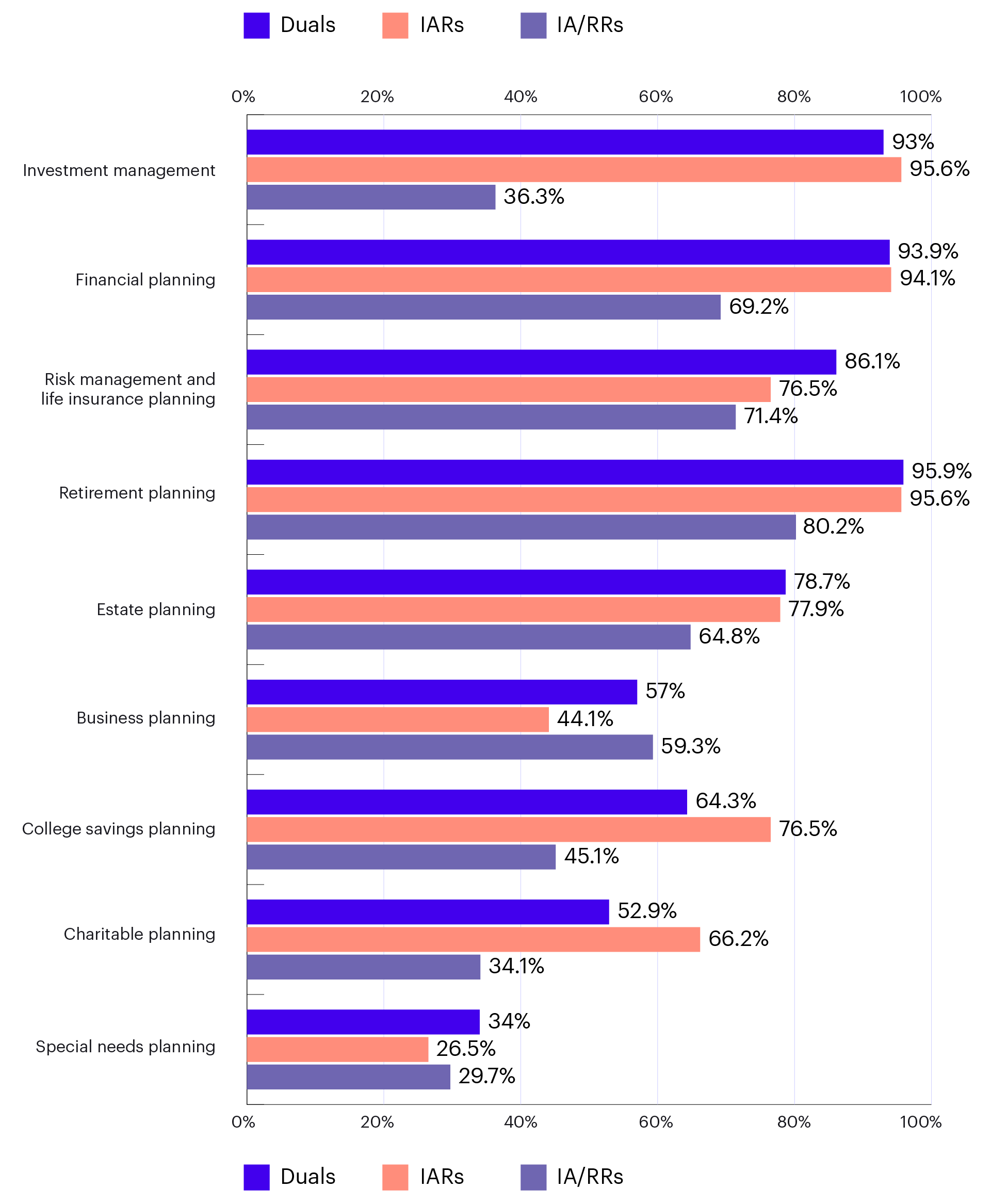
The American College of Financial Services. Advisory Services Survey. 2024.
What Strategies Do Advisors Use?
The data further suggests that independent advisors are leading the way in using various strategies – especially tax-informed planning strategies – to deliver the many services they offer clients. Financial professionals who are dually registered or IARs have a competitive advantage in delivering tax-informed planning strategies to differentiate their practices.
In contrast, insurance agents and registered representatives are often required to comply with the restrictions of their home office in regard to tax planning services. However, our research suggests that over half of these insurance agent and registered representative respondents employ tax-efficient withdrawal strategies (54%) and conduct tax planning around life events with their clients (51%).
Strategies Currently Used
By Advisor Type:
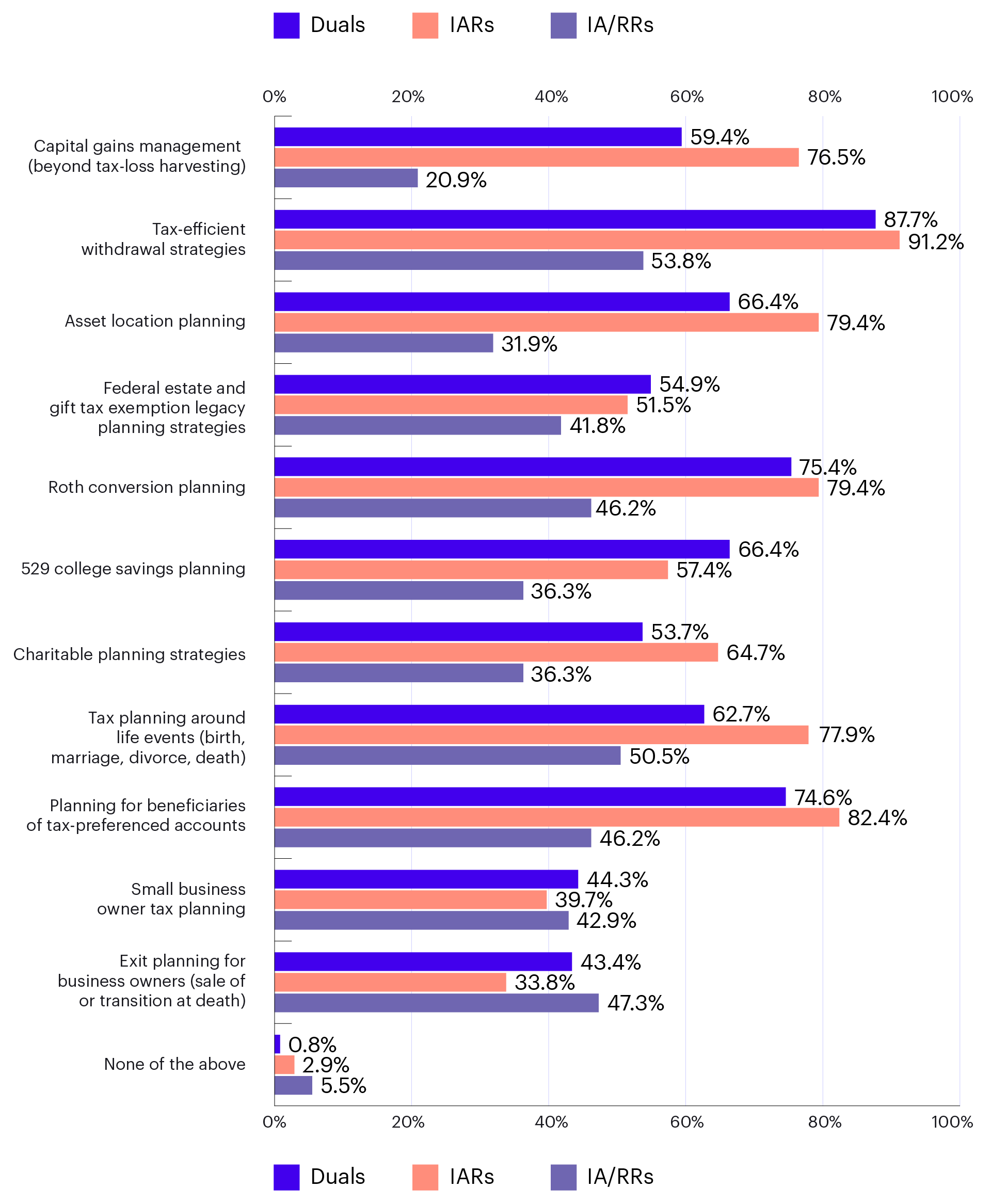
The American College of Financial Services. Advisory Services Survey. 2024.
Unfortunately, with many home offices not offering a comprehensive education on tax planning services, it would seem that the respondents currently utilizing these tax-efficient withdrawal strategies and conducting tax planning related to life events could benefit from some form of formal education to improve their effectiveness and raise overall client satisfaction.
“[Advisors] currently utilizing these tax-efficient withdrawal strategies and conducting tax planning related to life events could benefit from some form of formal education to improve their effectiveness and raise overall client satisfaction.”
What Services Are Not Being Offered?
Finally, the survey asked advisors about the services their clients frequently request – to reveal any gaps in their current offerings. When reviewing this data, one significant outlier emerges. More than 68% of insurance agents and registered representatives, 54% of IARs, and 57% of dually registered advisors reported small business owner tax planning as the most frequently requested service among those they are not currently providing.
This represents a sizable unmet need that could prove to be a differentiator for any advisors willing to add these services to their menu. Yet, without comprehensive education on tax planning services or robust tax planning resources, how can we ensure that financial professionals across the financial services ecosystem do tax planning well?
Strategies Not Used But “Always” or “Often” Requested
Small Business Owner Tax Planning:
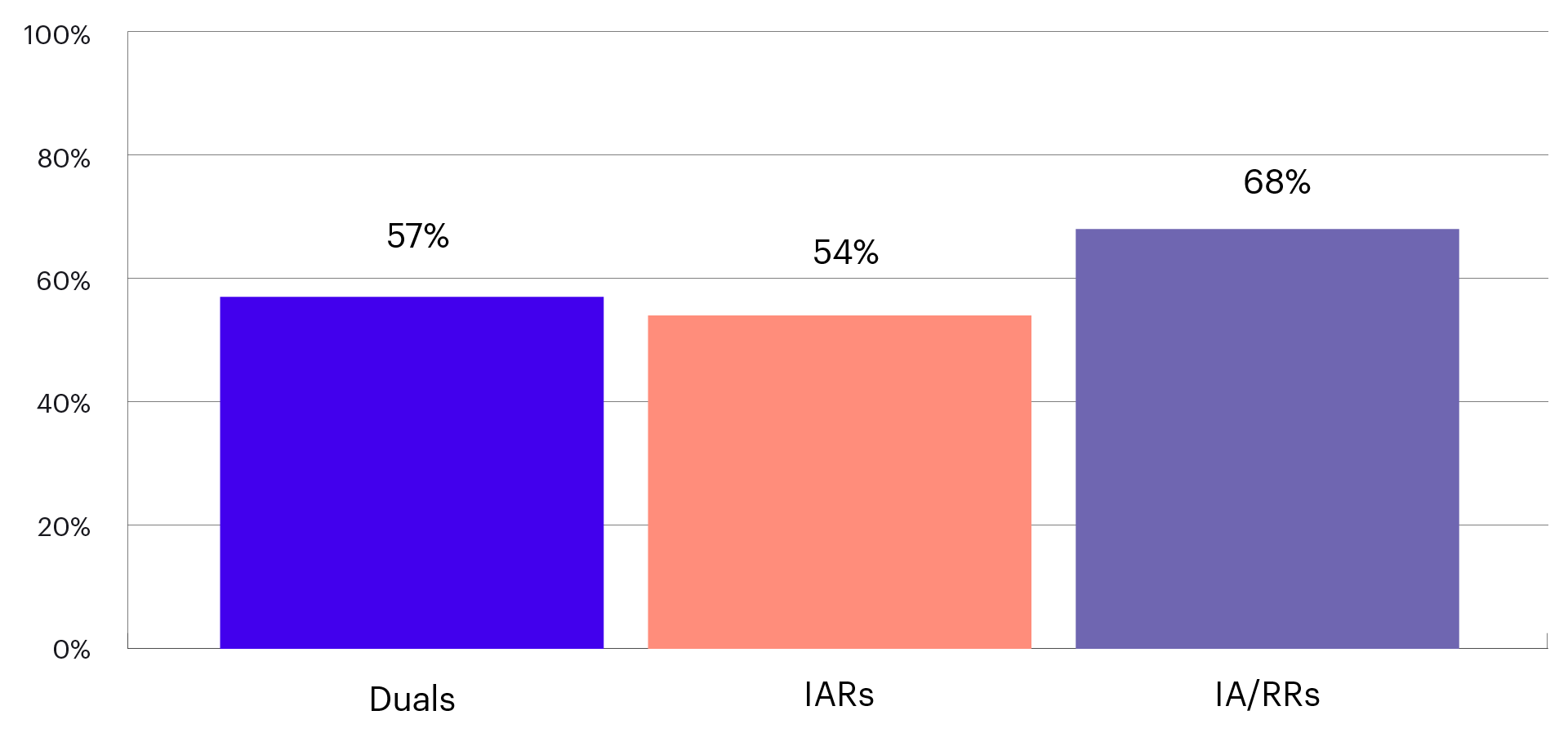
The American College of Financial Services. Advisory Services Survey. 2024.
Financial Planning Is Tax Planning
When reviewing the results of this survey in totality, an interesting trend emerges. Many advisors partake in some form of tax-informed financial planning. Independent advisors are more likely to say they engage in tax planning than others – but more than half of all types of advisors are currently employing tax-advantaged strategies. However, across all categories, advisors are not meeting the needs of their clients when it comes to small business tax planning, a valuable service that many advisors could benefit from offering to their clients.
Fortunately, financial advisors can address this gap through a new designation at The College. The Tax Planning Certified Professional® (TPCP®) program is The College’s latest offering to the financial services industry and addresses this need. As advisors look to implement advanced tax strategies in their own practices, the TPCP® program can help them by equipping participants with the skills to identify and evaluate these strategies for individuals and small businesses with a focus on maximizing tax benefits while ensuring compliance with current legislation.
The program covers a number of different topics including tax planning during the accumulation phase and the less frequently covered topic of tax planning during retirement (or the decumulation phase).
Enrollment for this powerful new designation launches in November and, with advisors already lining up to be among the first to call themselves a Tax Planning Certified Professional™, the time is perfect to seize this opportunity and join them as you look to grow your practice by improving your ability to meet the needs of your clients.
Learn about our Tax Planning Certified Professional® TPCP® program